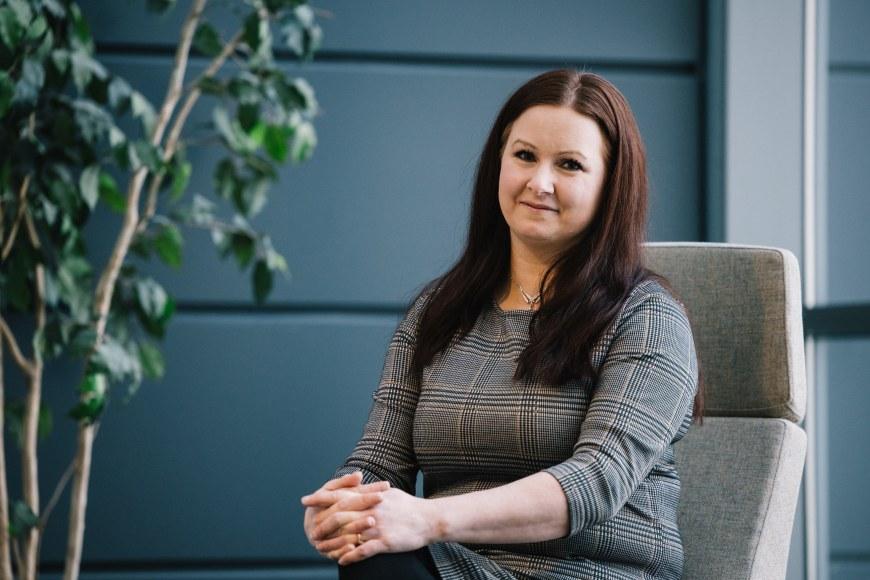Jenni Kulmala appreciates encounters: everyone is important until the end of life

Jenni Kulmala has investigated the health and well-being of old people for more than twenty years. She is interested in life course epidemiology, i.e. what old age looks like after all the things a person has experienced.
“In research, we can identify several factors during the life course that can help people maintain their health and functioning and live longer lives. Chance and genes play a role, but people can also do much themselves to have a good life. Studies show that, e.g., exercise and taking care of one’s mental well-being predict health and functional ability in old age,” Kulmala says.
After graduating as a public health nurse, Kulmala went to study gerontology and public health at the University of Jyväskylä. The dissertation she wrote at Jyväskylä dealt with the impact of visual acuity on functional performance, falls and mortality in old age.
Kulmala has held various positions at Gerontology Research Center GEREC, which is a joint institution for research on ageing and the ageing society at Jyväskylä and Tampere Universities.
Society benefits from old people’s life experiences
Professor Kulmala finds that people’s attitudes to ageing need updating. In public debate, she sees situations where old people are talked about as a single group even though there are vast differences in functional ability between people who have just retired and those who have lived for 90 years or more.
Kulmala calls for more attention to be paid to pensioners’ healthy years. She points out, for example, that after their work careers, pensioners are doing their share to close the care gap.
“People who have turned 65 are not that old yet. We should give credit to their role and not just talk about costs and pension timebombs. These people help in everyday life by taking care of their spouses and parents, but society does not appreciate pensioners enough,” she says.
Kulmala also reminds us of the need for services for the oldest people with chronic diseases and in the event of a decline in functional ability. About one in three people above the age of 90 are living with dementia. It is estimated that the number of people with memory disorders will rapidly increase in the next few years as more people will reach a very high age.
“People nowadays live up to a very old age, which is a major achievement of medicine and modern society. However, now that we are not dying prematurely, ageing has become a problem in public debate. The fact is that we cannot avoid an increase in service needs, and society should be prepared for the changes that come with longevity,” Kulmala points out.
“Old people are not a unified group who can simply be assigned a bed in a care home or are considered as a cost. Care needs vary between people and the same services are not suitable for everyone. People are people until their last breath. A person who has been valuable before is just as valuable at the end of life,” she says.
Changed attitudes are required when dealing with memory loss
Kulmala, who has been called a memory professor, also promotes the issue by being active in NGOs. Her most visible advocacy role is chairing the Alzheimer Society of Finland.
“I appreciate the increase in societal awareness of memory disorders. Still, I often come across attitudes where people living with dementia become invisible,” she says.
Kulmala says that people who have been diagnosed with Alzheimer’s disease have told her that they have previously come together with other people to do voluntary work, but after talking about their diagnosis, they have no longer been thought fit for, e.g., selling things at jumble sales.
“An early stage of Alzheimer’s disease does not necessarily change a person’s life so much. It may even relieve the patient’s mind and provide an explanation for symptoms. Once a diagnosis has been made, rehabilitation and medication can begin. A person can function in everyday life for a long time, and the disease is often not visible to outsiders,” Kulmala says.
Kulmala emphasises more serious situations that need to be addressed. Others must help when a person is obviously lost and, for example, scantily dressed despite frost. The personality changes caused by memory loss may sometimes be thought of as rude behaviour even though it is a physical illness.
Kulmala leads the Argumenta project, which is coordinated by Tampere University and funded by the Finnish Cultural Foundation where researchers try to find ways to improve life for persons living with dementia.
Argumenta aims to make society more dementia-friendly in a situation where most people will be affected by memory loss as either a patient or a person close to a patient. Argumenta organises workshops on memory loss themes. In them, experts from different fields — architects, theologians, psychologists, and health and medical professionals — talk about how society should change to improve the life of people with dementia.
Kulmala emphasises that people with dementia and their informal carers should be given a voice. Hearing them should increase the understanding of what it is like to live with memory loss. In the future, one of the greatest ethical challenges will be how to provide and organise care in socially sustainable ways.
In a more traditional research consortium called Living with dementia: Social relational perspective to sustainable care, which the Research Council of Finland is funding, Kulmala leads the sub-project at Tampere University. The research focuses especially on people living with dementia who are receiving various care services, and their family carers. Kulmala’s group is investigating, for example, how rehabilitation services are used when a person has a dementia diagnosis. The need for research is supported by the observation that the functional performance of people with memory disorders has not improved in the same way as in the general old population.
“People with dementia may find seeking and accessing rehabilitation services challenging. The question is whether they can be made visible as customers who cannot be ignored in service provision,” Kulmala says.
As a person and one’s own self in the academia
Kulmala says that her role models are professors Miia Kivipelto and Clas-Håkan Nygård. She thinks that these colleagues are leading researchers and very good at encountering people. Kulmala believes that more humanity is needed in the world of academia where competition may divide people depending on academic success. In fact, Kulmala wants to create security within her research group among funding and job pressures. Together, the group strives to find solutions to colleagues’ financial concerns.
Kulmala is not afraid to put herself on the line. Nobody should feel anxious or take their hat off to her because of her position.
“I cannot do this work wearing a mask. I still have two decades of my career left. I could not do this job as an institution, and I just want to be myself. Any critique is always targeted at work, to the things on paper. We improve the quality of research by hashing things out together with colleagues and supervisees,” she adds.
Welcome to the inaugural lectures of the new professors on 16 May 2024.
Jenni Kulmala
- Doctor of Health Science, Professor of Gerontology at Tampere University.
- Has held several positions in the research, development, and teaching of gerontology.
- Senior Researcher at National Institute for Health and Welfare (THL).
- Affiliated researcher at Karolinska Institutet in Sweden.
- Adjunct Professor of Gerontology and Public Health (University of Jyväskylä) and Gerontological Nursing (Åbo Akademi University).
- Active in NGOs as Chair of Alzheimer Society of Finland and editor-in-chief of the Finnish-language Gerontologia journal.
- Relaxes in the silence of her cottage and returns to academic work as her own true self.
Contact person
Jenni Kulmala
Professor Jenni Kulmala
Jenni KulmalaAuthor: Mikko Korhonen





